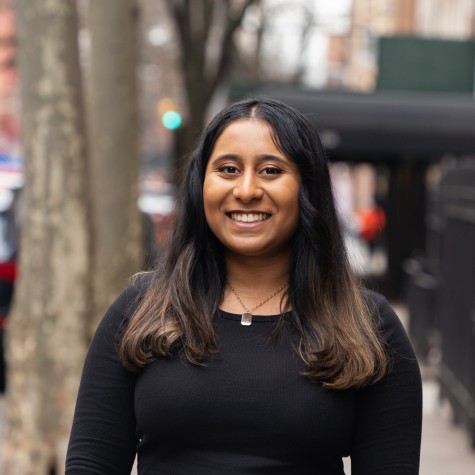Facing conflicting guidance, international students struggle with NYU COVID-19 vaccine requirements
For some international students, the only vaccine available is not NYU-approved, while others live in regions with limited access to any COVID-19 vaccine.
A Pfizer vaccine information label details its contents. International students face difficulties in regions without NYU-approved vaccines. (Staff Photo by Roshni Raj)
July 19, 2021
All NYU community members — in New York or at any of the university’s 15 global sites — are required to be fully vaccinated with a COVID-19 vaccine authorized by the World Health Organization or the Food and Drug Administration. However, some international students — primarily from Russia and India — are caught in a conflict between local vaccine availability and NYU’s vaccination rules.
Sputnik V, one of four approved COVID-19 vaccines in Russia, is not currently authorized by the WHO or FDA due to concerns over quality control and testing data integrity. Liberal Studies sophomore Etel Simkina — an international student from Russia — however, received her first dose of the Sputnik V vaccine in April, before NYU released its vaccine directive.
“I already had the first dose of the Russian vaccine, so there was no turning back,” Simkina said. “If I knew, I would wait and do Pfizer in New York. As I understand, they say you can’t go to classes unless you have been vaccinated with a United States vaccine, which is super weird because I mean if I have antibodies and my vaccine works, who cares?”
While most U.S. colleges and universities have taken a similar approach to NYU, requiring a WHO or FDA approved vaccine, there is no legal requirement for them to do so. Boston University, for example, said it will accept any COVID-19 vaccine, irrespective of WHO or FDA authorization.
NYU’s updated guidelines were published approximately one month after a provostial communication on April 19 mandating COVID-19 vaccination for students studying at the university’s three U.S. campuses in New York, Los Angeles and Washington, D.C.
“While we are encouraging NYUers outside the [United States] to be vaccinated with whatever vaccine is available where they are, those who have not been vaccinated with an FDA-authorized or WHO-approved vaccine will need to do so upon arrival,” NYU spokesperson John Beckman and Executive Lead of the COVID-19 Prevention & Response Team Dr. Carlo Ciotoli wrote in a joint statement to WSN.
Beckman and Ciotoli added that students who do not satisfy the requirement and are arriving from a country with a Level 4 travel risk assessment from the Centers for Disease Control and Prevention will need to quarantine.
India, which is currently a CDC Level 4-designated country, has currently approved four COVID-19 vaccines: Moderna, Oxford-AstraZeneca’s Covishield, Sputnik V, and the locally developed Covaxin. Siddhant Arora, an NYU Abu Dhabi first-year from Faridabad, India, received Covishield, which is approved by NYU, but said that many people he knows received Covaxin, which is not approved.
“When I registered for my vaccination, I saw the center that I was going to administered Covishield,” Arora said. “I know students who have gotten vaccinated by Covaxin [at other universities] and their life is […] complicated right now because they cannot get Covishield again because of the vaccine shortage, and the WHO has not approved Covaxin.”
Although Arora was ultimately able to satisfy NYU’s vaccination rules, other international students who are unable to do so have been told that the university will make arrangements for them to receive an approved vaccine when they arrive on campus. While vaccines are expected to be easily available at NYU’s New York, Los Angeles and Washington D.C. campuses, there has been no information for international students going to study away sites.
Varvara Rodionova, a Liberal Studies first-year from Russia, will spend her first year at NYU Florence as part of the Liberal Studies First Year Away program. She says she does not have access to a WHO-approved vaccine, and has not been given information about how she will get vaccinated upon her arrival in Italy.
“The problem is that this system definitely works for people who are going to [the] New York City campus. But I’m going to the NYU Florence campus and during their last webinar they said that there won’t be an opportunity to get vaccinated on campuses in Europe,” Rodionova said. “They said that everyone has to get vaccinated before they come to campuses in Europe. And I’m unable, obviously, to get vaccinated by any American vaccine or European vaccine which is approved so I’m kind of confused what to do in this situation.”
When asked if students will be guaranteed an approved vaccine and how it will be administered at the LS first-year study away sites, NYU spokesperson James Devitt wrote in an email to WSN that the June 3 press release serves as the university’s response.
“For students studying at sites other than New York, Los Angeles, and Washington, D.C., we will do everything possible to help you secure a vaccine upon your arrival, but given local vaccine supply constraints and regulations, this simply may not be possible everywhere,” the press release reads. “We will be writing to you again over the summer with additional site-specific information.”
Since the webinar in May, Rodionova says she has not been informed of additional information regarding the Florence campus. Aside from the webinar, Rodionova says NYU has not provided enough help to international students.
“Several times they just didn’t answer,” Rodionova said, referencing her emails to the StudentLink Center and the Student Health Center. “They said someone from student services will connect with me — this happened about two weeks ago and they still haven’t written anything to me yet, so I wasn’t given much help in this problem.”
Problems with vaccination accessibility are not unique to NYU, as many international students have faced similar problems at other American universities. Gallatin alum Sudhanshu Kaushik, who now works as the executive director of the North American Association of Indian Students, received several emails from Indian students who were confused about vaccination rules and access to campus life at American universities, including NYU.
“We were bombarded with a lot of questions from NYU students,” Kaushik said. “I think that they’ve been able to convey most of those answers from the International Student Office to my understanding, but I’m assuming that because NYU has so many international students, they were proactive in that.”
Kaushik believes these conversations have highlighted gaps that exist within the international community, university institutions and the government — a larger issue that has been exacerbated by COVID-19 and the pandemic.
“There’s a lack of contextual empathy when it comes to university administrations and the students that they try to cater to. They are the first to brag about diversity — all universities are — they’re the first to jump on tuition money that international students have to offer,” Kaushik said. “[But] are they providing equitable and accessible education for this large demographic?“
Contact Roshni Raj at [email protected].
























































































































































